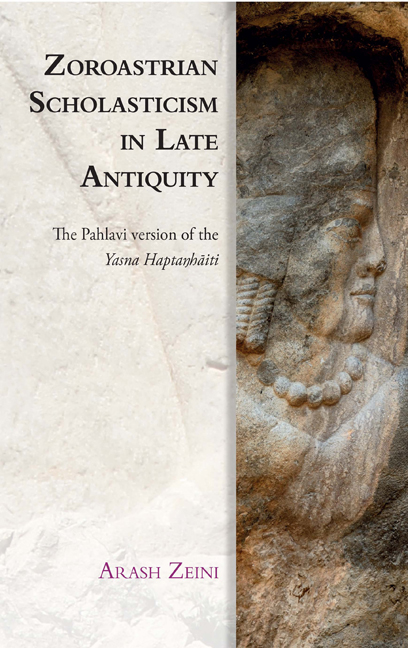Book contents
- Frontmatter
- Contents
- List of Figures
- List of Tables
- Acknowledgements
- Series Editor’s Preface
- Preface
- Conventions
- Abbreviations
- Dedication
- Part I Introduction
- 1 Introduction
- 2 The Zand
- 3 Scholasticism
- 4 Fire in Zoroastrianism
- 5 Precis: Yasn Ī Haft Hād
- Part II Text and translation
- 6 PY 35
- 7 PY 36
- 8 PY 37
- 9 PY 38
- 10 PY 39
- 11 PY 40
- 12 PY 41
- Part III Miscellaneous Observations
- 13 PY
- 14 PY 36
- 15 PY 37
- 16 PY 38
- 17 PY 39
- 18 PY 40
- 19 PY 41
- Part IV Epilogue
- 20 Reflections on the Zand
- Appendices
- Appendix A Transliteration and Apparatus
- Appendix B Y 9.1
- Appendix C Fire in the Older Avesta
- Appendix D Iϑā
- Appendix E MSS Concordance
- Bibliography
- Index of Passages Quoted
20 - Reflections on the Zand
Published online by Cambridge University Press: 14 October 2020
- Frontmatter
- Contents
- List of Figures
- List of Tables
- Acknowledgements
- Series Editor’s Preface
- Preface
- Conventions
- Abbreviations
- Dedication
- Part I Introduction
- 1 Introduction
- 2 The Zand
- 3 Scholasticism
- 4 Fire in Zoroastrianism
- 5 Precis: Yasn Ī Haft Hād
- Part II Text and translation
- 6 PY 35
- 7 PY 36
- 8 PY 37
- 9 PY 38
- 10 PY 39
- 11 PY 40
- 12 PY 41
- Part III Miscellaneous Observations
- 13 PY
- 14 PY 36
- 15 PY 37
- 16 PY 38
- 17 PY 39
- 18 PY 40
- 19 PY 41
- Part IV Epilogue
- 20 Reflections on the Zand
- Appendices
- Appendix A Transliteration and Apparatus
- Appendix B Y 9.1
- Appendix C Fire in the Older Avesta
- Appendix D Iϑā
- Appendix E MSS Concordance
- Bibliography
- Index of Passages Quoted
Summary
These intentions, however, do not necessarily agree with what Zarathushtra wanted to express, the Pahlavi translation of the Gāthās being full of misinterpretations of grammatical forms and of erroneous etymologies of Gāthic words.
(Humbach 1996: 260)A decade ago, Stausberg (2008) observed that research on Zoroastrianism had to some extent become marginalised in the study of religions. These days, philology, its actors and critical editions seem to carry most of the blame for the unfavourable position that Old Iranian Studies have taken in the peripheries of the intellectual sphere. A colleague once went so far as to state, jokingly of course, that the term ‘philologist’ was often used as an insult in the USA. Be that as it may, such views are not limited to our small discipline. In an interview, Papst (2017: 14) reminds Wolfram Groddeck, one of the lead editors behind the critical edition of Robert Walser's work, that editorial projects are often criticised with the charge that ‘a lot of public and private cultural funding is wasted here for something only a few can really benefit from’. Groddeck's twofold reply holds true not only for research on Robert Walser but textual editions in general:
Scholarly editions lay the basis for any future study of the texts. Walser is one of the greatest Swiss poets of the twentieth century, and the scholarly study of his work is an expression of appreciation in a society conscious of culture. In addition, historicalcritical editions have a different relationship to time than, for example, scientific research. They safeguard our literary heritage and are an investment in the future.
Any text, ancient or modern, is the result and manifestation of a culture. Although not exclusively, many times texts are our only path to an engagement with the past. As such, critical editions, particularly of maginalised texts like the Zand, are our first stepping stones in an endeavour to renew an inquiry into the principles of the priestly reception of the Avesta in late antiquity, an approach that seems poised to extend our insights into Zoroastrian intellectual history.
- Type
- Chapter
- Information
- Zoroastrian Scholasticism in Late AntiquityThe Pahlavi Version of the Yasna Haptaŋhāiti, pp. 285 - 302Publisher: Edinburgh University PressPrint publication year: 2020



